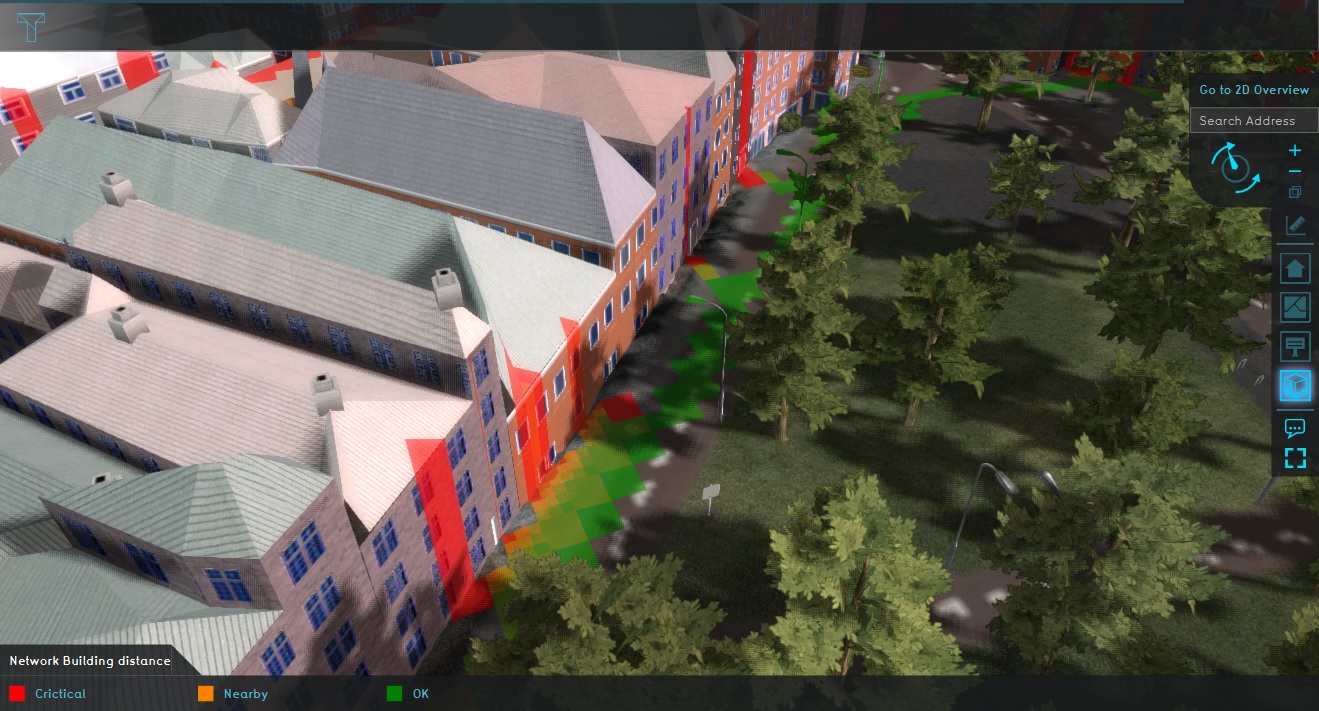Network Distance Overlay: Difference between revisions
No edit summary |
No edit summary |
||
| (5 intermediate revisions by 3 users not shown) | |||
| Line 1: | Line 1: | ||
[[File:Network Distance Overlay.jpg|thumb|right|350px|The Network Distance Overlay showing how much distance there is between Building and underground Net lines.]] | |||
[[File:Network Distance Overlay.jpg|thumb|right|350px|The Network Distance Overlay showing how much distance there is between | The Network Distance Overlay is a [[Grid Overlay]] which displays the distance (if any) between underground [[Net line]]s and [[Building]]s which extend into the underground. | ||
The Network Distance Overlay is a [[Grid Overlay]] which displays the distance (if any) between underground [[Net line]]s and [[ | |||
For each [[Grid cell]], the depth of the [[Net line]] is compared to the presence of underground [[ | For each [[Grid cell]], the depth of the [[Net line]] is compared to the presence of underground [[Building]]s, and [[Building]]s which are present in the underground. If a conflict is possible in a specific cell, the computed value for that cell is the smallest distance between any [[Net line]] and any [[Building]]. | ||
{{clear}} | {{clear}} | ||
==Distance calculation== | ==Distance calculation== | ||
[[Net line]]s are checked for distance against both [[ | [[Net line]]s are checked for distance against both [[Building]]s above ground and [[Building]]s below ground. This is done based on the [[Function Value]]s the [[Building]] has. The following details determine the extent of the [[Building]] in the underground for testing distance: | ||
* The [[Height offset (Function Value)|height offset]] of [[ | * The [[Height offset (Function Value)|height offset]] of [[Building]]s. This dictates the base of the [[Building]]. | ||
* The [[Basement height m (Function Value)|basement depth]] and the [[Depth of plant roots (Function Value)|root depth]] of [[ | * The [[Basement height m (Function Value)|basement depth]] and the [[Depth of plant roots (Function Value)|root depth]] of [[Building]]s added together. This makes the [[Building]] deeper than its base. | ||
* The [[Floor height m (Function Value)|floor height]] of [[ | * The [[Floor height m (Function Value)|floor height]] of [[Building]]s, multiplied by its amount of floors. In case the building belongs to the underground category, the floors extend downwards below the surface. | ||
If the [[Net line]]'s height passes through the extent of the [[ | If the [[Net line]]'s height passes through the extent of the [[Building]], the computed distance is 0. Otherwise, the distance between either the top or the bottom of the [[Building]] is used. | ||
{{article end | {{article end | ||
| notes= | | notes= | ||
* [[Net line]]s are not checked against the presence of other [[Net line]]s in the same cell. | * [[Net line]]s are not checked against the presence of other [[Net line]]s in the same cell. | ||
* A [[ | * A [[Building]]'s [[Slanting roof height (Function Value)|slating roof height]]s currently does not contribute to the height of the [[Building]] for the calculation of this [[Overlay]]. | ||
* [[Net line]]s do not to be explicitly active to be tested. | * [[Net line]]s do not need to be explicitly active to be tested. | ||
* This model does not yet work well for netlines with diameters larger than the grid size. | * This model does not yet work well for netlines with diameters larger than the grid size. | ||
|seealso= | |seealso= | ||
Latest revision as of 11:43, 7 October 2022

The Network Distance Overlay is a Grid Overlay which displays the distance (if any) between underground Net lines and Buildings which extend into the underground.
For each Grid cell, the depth of the Net line is compared to the presence of underground Buildings, and Buildings which are present in the underground. If a conflict is possible in a specific cell, the computed value for that cell is the smallest distance between any Net line and any Building.
Distance calculation
Net lines are checked for distance against both Buildings above ground and Buildings below ground. This is done based on the Function Values the Building has. The following details determine the extent of the Building in the underground for testing distance:
- The height offset of Buildings. This dictates the base of the Building.
- The basement depth and the root depth of Buildings added together. This makes the Building deeper than its base.
- The floor height of Buildings, multiplied by its amount of floors. In case the building belongs to the underground category, the floors extend downwards below the surface.
If the Net line's height passes through the extent of the Building, the computed distance is 0. Otherwise, the distance between either the top or the bottom of the Building is used.
Notes
- Net lines are not checked against the presence of other Net lines in the same cell.
- A Building's slating roof heights currently does not contribute to the height of the Building for the calculation of this Overlay.
- Net lines do not need to be explicitly active to be tested.
- This model does not yet work well for netlines with diameters larger than the grid size.
See also